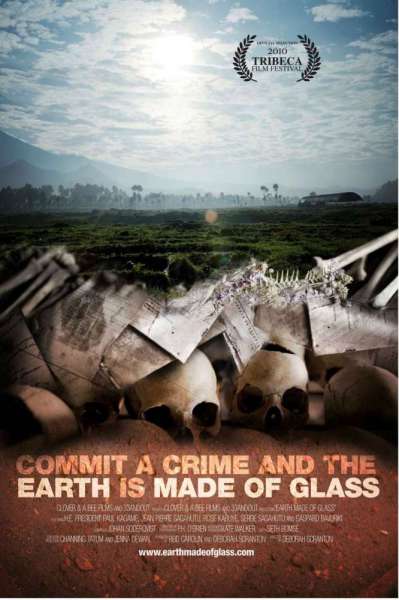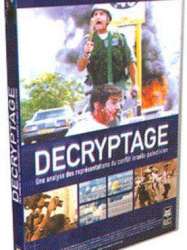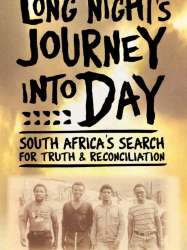Earth Made of Glass is a american film of genre Documentary released in USA on 6 april 2011
Earth Made of Glass (2011)

If you like this film, let us know!
Released in USA 6 april 2011
Length 1h28
OriginUSA
Genres Documentary
Themes Films set in Africa, Films about racism, Documentary films about racism, Documentary films about law, Documentary films about war, Documentary films about historical events
Rating77%










Earth Made of Glass is a 2010 American documentary film, directed by Deborah Scranton, about the 1994 Rwandan Genocide. Filming occurred in Rwanda and France. It premiered at the 2010 Tribeca Film Festival, in the World Documentary Competition, on April 26, 2010.
Earth Made of Glass aired on HBO TV in April 2011, and it was nominated as Best Documentary by the Producer's Guild of America. The film won a Peabody Award in 2012.
Synopsis
In 2008, Paul Kagame, as President of Rwanda, had released the findings from an investigation into the massacre which had occurred there in 1994, when fighting began in the Eastern Congo at Rwanda's western border. The influence of French military interference in Rwanda plus the Belgian occupation are explained, in relation to the long-time feud between the Hutus and Tutsis, Rwanda's two main ethnic groups. Meanwhile, survivor Jean-Pierre Sagahutu, whose family had died during the violence, seeks to track down the man who had murdered them. Sagahutu eventually finds the culprit and decides what to do next.Comments
Leave comment :
Suggestions of similar film to Earth Made of Glass
There are 8869 with the same cinematographic genres, 3568 films with the same themes (including 19 films with the same 6 themes than Earth Made of Glass), to have finally 70 suggestions of similar films.If you liked Earth Made of Glass, you will probably like those similar films :
 , 1h20
, 1h20Directed by Roger Spottiswoode
Origin USA
Genres Documentary
Themes Films set in Africa, Films about racism, Films about religion, Films about terrorism, Documentary films about racism, Documentary films about law, Documentary films about war, Documentary films about historical events, Documentaire sur une personnalité, Documentary films about politics, Documentary films about religion, Political films, Films about Jews and Judaism
Rating71%






Décryptage (2003)
Directed by Philippe Bensoussan
Origin France
Genres Documentary
Themes Films set in Africa, Films about racism, Films about religion, Documentary films about racism, Documentary films about law, Documentary films about war, Documentary films about historical events, Documentary films about politics, Documentary films about religion, Political films, Films about Jews and Judaism
Rating74%





Ce documentaire tente de décrypter les commentaires tenus sur le conflit israélo-palestinien et de répondre aux questions suivantes : comment parle-t-on du conflit au Proche Orient ? Comment parle-t-on de ses protagonistes ? Pourquoi ces troubles font-ils l'objet de passions aussi fortes ? Quelle est la mécanique des médias qui instruisent l'opinion ?
 , 1h34
, 1h34Origin USA
Genres Documentary
Themes Films set in Africa, Films about racism, Documentary films about racism, Documentary films about law, Documentary films about war, Documentary films about historical events, Documentaire sur une personnalité, Documentary films about politics, Political films
Actors Helen Mirren
Rating75%






L'Afrique en morceaux (2000)
, 1h44Origin France
Genres Documentary
Themes Films set in Africa, Films about racism, Documentary films about racism, Documentary films about law, Documentary films about war, Documentary films about historical events, Documentaire sur une personnalité, Documentary films about politics, Political films
April, 1994. Genocide in Rwanda. 800,000 dead. A catastrophe that upset the balance in the entire region. The Great Lakes region of Africa ended the year with a bloodbath. This documentary shows the intrigues, the dramatic effects, the treasons, the vengeances that prevailed over those years and whose only goal was to maintain or increase each faction’s area of influence. In just ten years, the population saw all their hopes vanish: The dream of an Africa in control of its own destiny, alimentary self-sufficiency, the end of interethnic conflicts.
 , 1h
, 1hDirected by Andrew Goldberg
Origin USA
Genres Documentary
Themes Films set in Africa, Films about racism, Films about religion, Documentary films about racism, Documentary films about law, Documentary films about war, Documentary films about historical events, Documentaire sur une personnalité, Documentary films about politics, Documentary films about religion, Political films, Films about Jews and Judaism
Rating67%






Umurage (2002)
, 52minutesOrigin Espagne
Genres Documentary
Themes Films set in Africa, Films about racism, Documentary films about racism, Documentary films about law, Documentary films about war, Documentary films about historical events, Documentaire sur une personnalité, Documentary films about politics, Political films
In Rwanda, a hundred members of the Ukuri Kuganze Association, made up in its majority by survivors of the genocide, and a few of their executioners, freed after having confessed and asked for forgiveness in 2003, meet at a reinsertion center. These executioners are going home, in most cases to the same places where they carried out their crimes, and will have to "face" their victims and ask their forgiveness. In 1994, over a space of just one hundred days, almost a million people were murdered, that makes 10,000 dead per day.

Rwanda pour mémoire (2003)
, 1h8Directed by Samba Félix Ndiaye
Origin France
Genres Documentary
Themes Films set in Africa, Films about writers, Films about racism, Documentary films about racism, Documentary films about law, Documentary films about war, Documentary films about historical events, Documentaire sur une personnalité, Documentary films about politics, Political films
In 1994, between April and July, the massacre of Tutsis and moderate Hutus left one million dead. Instigated by Fest’Africa, a dozen African authors met four years after the events as writers in residence at Kigali, to try to break the silence of African intellectuals on this genocide.

Sweet Dreams (2012)
, 1h26Directed by Lisa Fruchtman
Origin USA
Genres Drama, Documentary, Historical, Musical
Themes Films set in Africa, Films about music and musicians, Films about racism, Documentary films about racism, Documentary films about law, Documentary films about war, Documentary films about historical events, Documentary films about music and musicians, Documentaire sur une personnalité, Documentary films about politics, Musical films, Political films
Rating76%






The Uncondemned (2016)
, 1h25Origin USA
Genres Documentary, Crime
Themes Films set in Africa, Films about racism, Documentary films about racism, Documentary films about law, Documentary films about war, Documentary films about historical events
Rating80%





The Uncondemned recounts the 1997 trial of Jean-Paul Akayesu for his alleged knowledge of the rapes and other war crimes during the Rwandan Genocide in 1994. The film features three women, who were victims of rape and anonymously testified in the trial, as well as American prosecutors Pierre-Richard Prosper and Sara Darehshori recalling their building the case against Akayesu.

Flower in the Gun Barrel (2008)
Origin USA
Genres Documentary
Themes Films set in Africa, Films about racism, Documentary films about racism, Documentary films about law, Documentary films about war, Documentary films about historical events, Documentaire sur une personnalité, Documentary films about politics, Political films
Rating80%





To a large extent, the film consists of interviews with genocide survivors, many of whom were children in 1994. In all, over thirty survivors, perpetrators, and experts were interviewed for the film. In these interviews, the survivors discuss what it means to be a Rwandan and to live next door to people who killed their families. The survivors describe how they deal with their country's request that they forgive one another and move on, so that Rwanda can rebuild and unify itself. Perpetrators' views illuminate the madness that seized the culture in 1994; exploring the experience of apologizing to victims, and examining what it is like to be looked at as a murderer in Rwandan society.
 Connection
Connection